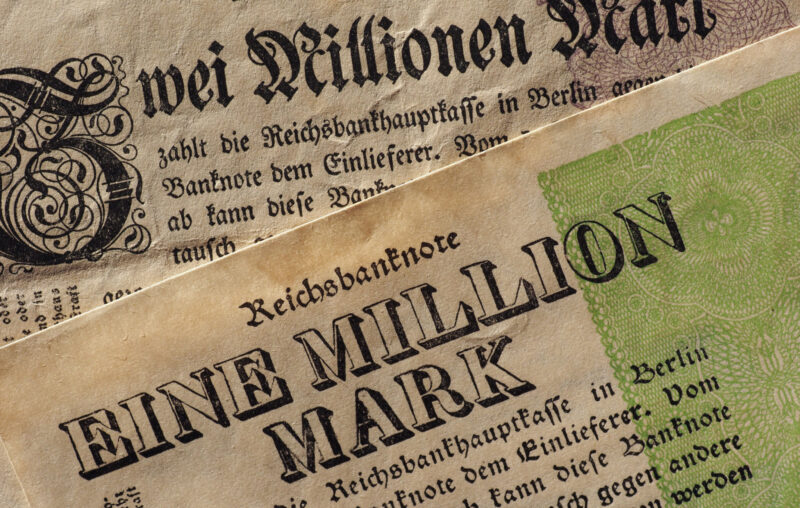The (Other) Cost of Inflation: Inflation Erodes More Than the Value of Money, History Shows

Across the world, people are struggling under the specter of inflation.
In Venezuela, the inflation rate is 360 percent. In Argentina, it’s 160 percent. In Turkey, inflation is about 50 percent, about 10 percent higher than its neighbor Iran.
In Europe, inflation of the euro has finally cooled to about 3 percent, down from more than 10 percent a year ago. Canada and the United States have witnessed a similar pattern.
Even if Europe and North American countries can continue to rein in inflation — and that’s a very big if — the consequences of governments’ inflationary policies have already been realized. The value of people’s earnings and savings has been severely (and likely permanently) eroded.
The depreciation of real income causes serious pain for consumers and families, particularly poorer families who spend a higher percentage of their income on food and housing, commodities that tend to be disproportionately impacted by inflation.
“Lower-income households experienced above-average inflation because of their higher proportional spending on food and housing, categories for which prices were rising more rapidly at the time (especially during 2020, with the onset of the pandemic),” a study by the Federal Reserve Bank of New York concluded earlier this year.
While the pernicious effects of inflation have been exhaustively detailed in recent years, one effect of inflation has received little attention: its impact on morality.
‘During Every Great Inflation’
The idea that inflation could affect morality might sound strange to some readers; It certainly did to me when I first heard the hypothesis. Yet, one of the most famed economic writers in history saw a clear link between inflationary policy and corruption (both public and private).
“During every great inflation there is a striking decline in both public and private morality,” Henry Hazlitt, the author of Economics in One Lesson, once observed.
One of the authorities Hazlitt cites is the historian Andrew Dickson White (1832–1932), author of Fiat Money Inflation in France. White, an abolitionist and graduate of Yale University who cofounded Cornell University weeks after the conclusion of the Civil War, had a deep interest in monetary policy and French history.
During his European travels, which stretched back to before the American Civil War, he collected an impressive array of primary sources from Revolutionary France — “newspapers, reports, speeches, pamphlets, illustrative material of every sort, and, especially, specimens of nearly all the Revolutionary issues of paper money” — which he used to publish his book in 1912.
In his work, White discusses how money printing in France led to not just monetary decay, but moral decay, and explains how it happened:
Out of the inflation of prices grew a speculating class; and, in the complete uncertainty as to the future, all business became a game of chance, and all businessmen, gamblers. In city centers came a quick growth of stockjobbers and speculators; and these set a debasing fashion in business which spread to the remotest parts of the country….In this mania for yielding to present enjoyment rather than providing for future comfort were the seeds of new growths of wretchedness: luxury, senseless and extravagant, set in. This, too, spread as a fashion. To feed it, there came cheatery in the nation at large and corruption among officials and persons holding trusts. While men set such fashions in private and official business, women set fashions of extravagance in dress and living that added to the incentives to corruption…
Harvard Researchers: ‘A Positive Relationship Between Corruption and Inflation’
White’s book, which is freely available online courtesy of Project Gutenberg, is worth reading for anyone interested in history or monetary policy. While I find his thesis persuasive — White offers copious examples to show how loose money creates loose behavior — many readers will argue there’s an obvious problem: It’s unfalsifiable.
In one sense, they have a point.
While there’s no shortage of academics who argue morality can be measured — see Jonathan Haidt’s Moral Foundations Theory and the Schwartz Value Survey — I’m skeptical that humans can agree on a universal moral code, let alone accurately quantify morality in human populations.
Still, like just about anything, morality can be studied, and empirical evidence can be gathered. And there’s persuasive evidence that supports the idea that inflation corrupts.
For example, a prominent 2004 study conducted by Harvard researchers Miguel Braun and Rafael Di Tella found that higher levels of inflation variability tend to lead to more government corruption (and less capital investment).
“We document a positive relationship between corruption and inflation variability in a sample of 75 countries,” the authors wrote.
‘A Nursery of Tyranny, Corruption, and Delusion’
Corruption is just one way to measure public morality, of course. Crime levels are another.
The hyperinflation Weimar Germany (1918–33) experienced during the early 1920s is well known. Less well known is the surge in crime during the inflationary period, though it’s something Hazlitt discussed.
“It is no coincidence that crime rose sharply during the German inflation,” he wrote. “On the basis of 1882=100, the crime rate, which stood at an index number of 117 in 1913, rose to 136 in 1921 and 170 in 1923. It declined again in 1925, when the inflation was over, to 122.”
The rise in crime, however, was just one example of a much broader collapse in virtue and stability during the Weimar period. The historian Richard Evans touched on this topic in his 2005 book The Coming Third Reich:
Money, income, financial solidarity, regularity, economic order, and predictability had been at the heart of the bourgeois values and bourgeois existence before the war. A widespread cynicism began to make itself apparent in Weimar culture… It was not least as a consequence of the inflation that Weimar culture developed its fascination with criminals, embezzlers, gamblers, manipulators, thieves and crooks of all kinds. Life seemed to be a game of chance, survival a matter of the arbitrary impact of incomprehensible economic forces.
Evans’s description of the consequences of inflationary policy is but a longer, more artful version of that offered by the esteemed French statesman Honoré Gabriel Riqueti, Count of Mirabeau, who at the dawn of the French Revolution warned, in a private letter, that inflationary policy was “a nursery of tyranny, corruption, and delusion.”
Mirabeau was right, but this didn’t stop him from pushing paper notes to finance public works while a Member of the Constituent Assembly, a policy that no doubt contributed to France’s descent into tyranny.
Mirabeau died of pericarditis early in 1791 at just 42 years of age, not long after yielding to pressure to pass a paper-money scheme. He never witnessed the full tyranny he predicted (and his own policies helped bring about): the Reign of Terror.
‘Developed in Obedience to Natural Laws’
White’s point is that the tyranny in France did not come about accidentally. It stemmed directly from its monetary policy.
Figures from the French Revolution are hard to come by (especially if you don’t read French), but a new paper published in European Economic Review described France’s monetary policy as “an explosion of paper money called the assignat,” which resulted in a hyperinflation Europe would not experience again until the twentieth century.
White goes so far as to suggest that the horrors of the French Revolution were an unavoidable consequence of France’s inflationary policies.
“Thus was the history of France logically developed in obedience to natural laws,” he writes.
This is similar to Hazlitt’s thesis that bad money will inevitably result in bad behavior. This might be a tough thesis to swallow — particularly for those who live in the age of fiat money — but other historical examples are easily found. Henry VIII’s lavish lifestyle and many wars were enabled by expansionary monetary policy — what historians refer to as The Great Debasement. Even the Bible hints at a link between inflation and moral decay.
“Your silver has become dross, your best wine mixed with water,” the Prophet Isaiah chided (1:22).
Isaiah was preaching at a time during which the people of Israel, particularly its leaders, were morally wretched, or so we’re led to believe.
I’ll leave it an open question for readers to decide whether the United States’ own expansion of the money supply has resulted in a collapse of private and public morality. Though I’ll point out that Hazlitt, writing during the Carter administration, argued that the rise of public immorality was already well underway, and that it stemmed directly from its debauched currency.
I also suspect that White, if the great scholar was alive today, would look at American society — its endless wars, public corruption, and questionable taxpayer-funded initiatives — and simply say, “I told you so.”









